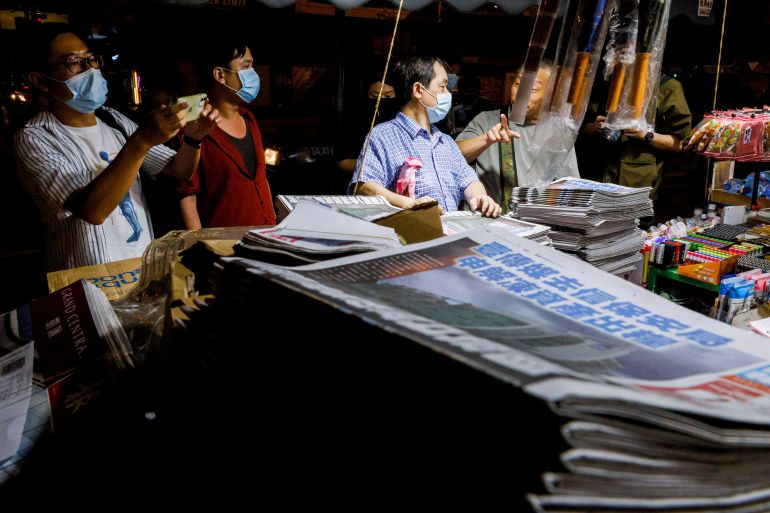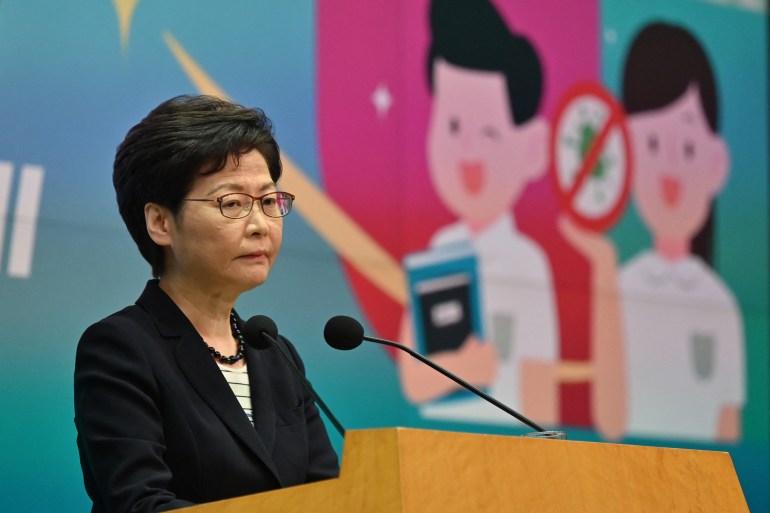Hong Kong leader defends crackdown on Apple Daily
Carrie Lam slams criticism of moves against Apple Daily as attempt to ‘beautify’ acts that endanger national security.

Hong Kong’s leader has defended a crackdown on the pro-democracy Apple Daily newspaper, insisting that the arrest of senior editors and a freeze on its assets did not amount to an attack on press freedom.
Carrie Lam’s comments on Tuesday came after the United States criticised the Hong Kong authorities’ use of the China-imposed national security law to target the tabloid.
Keep reading
list of 4 itemsTaiwan to ‘adjust’ Hong Kong office operations in ‘one China’ row
Photos: Hong Kong democracy activists ‘starting over’ in the UK
Hong Kong police arrest Apple Daily editor, directors, raid HQ
Hundreds of police raided the newspaper last week as part of a national security probe in which Editor-in-Chief Ryan Law and Chief Executive Officer Cheung Kim-hung were arrested and charged with conspiracy to commit “collusion with a foreign country”.
Authorities also froze 18 million Hong Kong dollars’ worth ($2.3 million) of the tabloid’s assets.
The clampdown marked the first time authorities had targeted media articles under the security legislation, which punishes anything deemed secession, subversion, terrorism and collusion with up to life in prison.
Rights groups, media organisations and Western governments have criticised the actions and expressed concern about freedom of the press and other rights in the semi-autonomous territory.
In Washington, State Department spokesman Ned Price said the US was deeply concerned by “selective” and “politically motivated” use of the security law.

Speaking at her regular weekly news conference on Tuesday, Lam singled out the US comments, telling reporters the accusations were wrong and applied double standards.
She said the actions taken by authorities did not target press freedom.
“Don’t try to underplay the significance of breaching the national security law,” Lam said. “Don’t try to beautify these acts of endangering national security.”
“And don’t try to accuse the Hong Kong authorities for using the national security law as a tool to suppress the media or to stifle the freedom of expression,” she added.
Unlike mainland China, where the press is overwhelmingly state-owned and heavily censored, Hong Kong’s mini-constitution includes free speech protections.
But the new national security law has criminalised a host of political views and the action against Apple Daily has left the media wondering what views or reporting could trigger an investigation.
Apple Daily has come under increasing pressure since its owner Jimmy Lai was arrested last year under the national security law.
Lai, whose assets have also been frozen under the security law, is already serving a prison sentence for taking part in unauthorised assemblies.
On Monday, Mark Simon, an adviser to Lai, said the publication would be forced to shut down in “a matter of days”.
Earlier on the same day, an internal sent to staff said the newspaper looks set to close for good by Saturday unless Hong Kong authorities released the frozen assets.
The memo said no articles would be uploaded to Apple Daily’s website after 11:59pm (15:59 GMT) on Friday and that the last newspaper will come out on Saturday morning.
Hong Kong’s RTHK broadcaster said Apple Daily aired its last live news show on Monday night, with journalists thanking the audience for their support since the programme went live last October.
More than 30,000 people logged on for the final show, it said.
On Tuesday morning, a brief statement addressed “Dear readers” said it would no longer update its English language website.
“Thank you for your support,” it said.